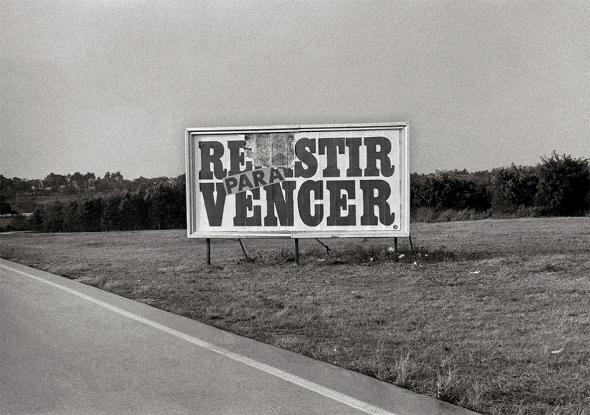|
Goodman Gallery Cape Town Opening Saturday 28 January at 5pm
Los Carpinteros • Flávio Cerqueira • Elizabet Cerviño • Ângela Ferreira • Carlos Garaicoa • Kendell Geers • Haroon Gunn-Salie • Kiluanji Kia Henda • Grada Kilomba • KutalaChopeto • Paulo Nazareth • Sisipho Ngodwana • Antônio Obá • Rosana Paulino • Wilfredo Prieto • Tracey Rose • Gustavo Speridião
IN THE VIDEO ROOM Maria Thereza Alves • Coco Fusco • Binelde Hyrcan • Thiago Martins de Melo • Susana Pilar Delahante Matienzo
FEATURED PERFORMANCES iQhiya • Elizabet Cerviño • Ângela Ferreira’s Wattle and Daub with vocals by Lizette Chirrime*
Curated by Renato Silva and Lara Koseff
In the second edition of our South-South series, Goodman Gallery presents Let me begin again, an exhibition drawing parallels between artists from the Global South, whose work is situated within and beyond the afterlife of political revolution. The show looks at cross- cultural influence and divergence – both historical and recent – between countries such as Cuba, Brazil, South Africa and Angola, as well as other regions such as Mozambique, and Namibia; featured artists born in or living between these countries or in the diaspora.
Let me begin again considers a paradisal vision of race and class equality, and autonomy from Western domination, championed in the mid- to late 20th century. It is rooted in an intersection and unravelling of ideologies that emerged after revolution in Cuba, the end of military dictatorships in other parts of Latin American and independence in Africa, building up to the end of apartheid in the 1990s. The exhibition explores notions of freedom and control; artists revising and recalling historical moments, and challenging instability, yet sometimes embracing flux, in ways that are divergent from, but still linked to, political movements.
In July 1991, Nelson Mandela, president of the African National Congress (ANC) at the time, and Fidel Castro, then president of Cuba, spoke together on the same platform in Havana. Mandela was on a tour of Latin America, but his visit to Cuba marked an important moment for both world leaders. This interaction reflected Cuba’s mission of internationalism in the Global South; its support of African independence and involvement in the Angolan Civil War, which Mandela attributed as directly leading to the unbanning of the ANC. “The decisive defeat of the aggressive apartheid forces [in Angola] destroyed the myth of the invincibility of the white oppressor,” Mandela said. Both Mandela and Castro spoke of the emancipation of the poor and the rightless. Castro exclaimed persistently, “How far we slaves have come!” On reflection, these were distinct leaders from regions emerging from and moving towards different socio-political realities. But they were also converging on a conviction of equality; finding common ground in evoking the power of what Ernesto Che Guevara called – in reference to the strength of the masses – the human tide. Yet at the time, while victories such as free and quality health care and education were celebrated, the disappointments of transition where becoming palpable in Cuba – which in the early 1990s was deep in economic crisis due to the dissolution of the Soviet Union. And in Brazil, profound yet often concealed wounds were still only very slowly being revealed. Following Cuba, Mandela visited Brazil in August 1991, in efforts to seek continued sanctions in support for the end of apartheid. While there Mandela stated, “I have the feeling of being at home,” but was taken aback by the nuances of racial politics, and the latent and often clouded racial discrimination that lingered despite the transition into democracy.
Rereading this meeting of minds now – 25 years later, with dreams further deferred, tenuous diplomatic breakthroughs between enemy states, dissident voices, state control, unfinished projects, presidents on trial, lingering mass inequality and institutional racism, as well as looming neo-colonialism, is revealing and disheartening. While the world seemed to stop after the death of Mandela – his critics emerging mainly from South African – it was at odds over Castro’s more recent obituary, and his very polarising legacy. In a time when the Western world is again seeing the rise of the extreme right, the Global South appears to be grappling with the ideals, victories, as well as conflicting narratives and setbacks of the revolutionary left. Within this context of emerging economies and racially diverse societies, seems to be a need not only to move forward, but to revise and reconsider where we came from, to recover what has been lost.
This show comes 20 years after pivotal exhibitions such asMemorias Intimas Marcas – initiated by Fernando Alvim, in collaboration with Gavin Younge and Carlos Garaicoa, which looked at the residue of trauma caused by the Angolan Civil War – and the 2nd and last Johannesburg Biennale, curated by Okwui Enwezor, which unusually for the international art world at the time included many artists from the Global South. Now, this edition of South-South reflects on how the ideologies that were being embraced in the 1990s have unfolded or collapsed in quieter, contemplative moments, but are also being reignited or challenged in new instances of heated rupture.
Let me begin again offers a deferential plea to unearth the forgotten; rethink the misrepresented or misunderstood; confront the seemingly irreversible; tackle unfinished projects and traverse unending beginnings. Featured artists embody a variety of divergent socio-political stances and, in some cases, markedly or seemingly apolitical ones. But in each instance is the sensation of – or a call for – reinvention, renewal or adaptation, from historiography to processes of working.
Let me begin again follows The Poetry in Between: South-South, the first edition in the series in 2015, which focused on Brazil and South Africa in particular.
|

